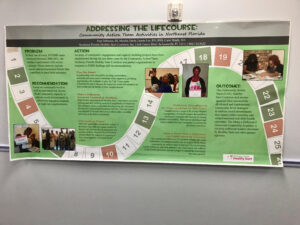Since 1999, the Magnolia Project has worked to reduce infant mortality by improving the health of at-risk women before and between pregnancy. This approach was adopted in response to the Perinatal Periods of Risk analyses and findings from the Fetal and Infant Mortality Review that demonstrated the impact of pre- and interconceptional health on poor birth outcomes, particularly for Black mothers.
The Magnolia Project utilizes a life course approach with a strong focus on social equity and the social determinants of health¹. Individual and group interventions are used to address risks and build the reproductive health capital of the community served by the project. According to Lu et al. (2010), the life course perspective conceptualizes birth outcomes as the end product of not only the nine months of pregnancy but the entire life course of the mother before pregnancy. As a result, disparities in birth outcomes are the consequences of both differential exposures during pregnancy and differential developmental trajectories across the life span, including adolescence. As a major component of the life course, the Magnolia Project and other NEFHSC programs focus on the effects of stress, particularly what’s known as toxic stress. This body of work has been occurring for 25 years and it’s encouraging to see other groups now engaging in this important work.
focus on social equity and the social determinants of health¹. Individual and group interventions are used to address risks and build the reproductive health capital of the community served by the project. According to Lu et al. (2010), the life course perspective conceptualizes birth outcomes as the end product of not only the nine months of pregnancy but the entire life course of the mother before pregnancy. As a result, disparities in birth outcomes are the consequences of both differential exposures during pregnancy and differential developmental trajectories across the life span, including adolescence. As a major component of the life course, the Magnolia Project and other NEFHSC programs focus on the effects of stress, particularly what’s known as toxic stress. This body of work has been occurring for 25 years and it’s encouraging to see other groups now engaging in this important work.
